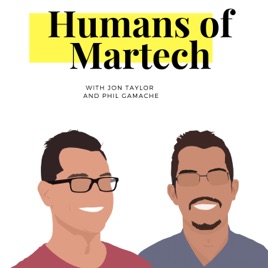
Advertise on podcast: Humans of Martech
Rating
5 from
This podcast has
108 episodes
Language
Publisher
Explicit
Yes
Date created
2020/09/25
Average duration
53 min.
Release period
10 days
Description
Future-proofing the humans behind the tech. Follow Jon and Phil on their mission to help marketers level up and have successful careers in the constantly evolving world of martech.
Social media
Check Humans of Martech social media presence
Podcast episodes
Check latest episodes from Humans of Martech podcast
107: Justin Norris: What MOPs can learn about AI from WALL-E and Star Trek
2024/02/20
Summary: Justin is a polished voice of reason in martech. In our conversation, he focused on the practicality of AI, highlighting its capability to transform data into actionable insights, aiding in a deeper understanding of customer needs. We also covered the shift towards flexible, composable tech stacks and the importance of diverse skills alongside a few Sci-fi references. He also proposed a transparent, Shark Tank-style approach for selecting martech vendors, underscoring the need for effective evaluation methods. This episode offers practical guidance for marketers aiming to navigate the rise of gen AI in marketing.
Balancing Opportunity and Skepticism With AI in Marketing
Justin's insights highlight a critical juncture in marketing technology: the integration of AI, specifically GPT-4, into daily practices. He acknowledges the prevalent fear of missing out (FOMO) among marketers, emphasizing the importance of staying abreast with AI advancements. Justin points out the dual nature of this fear: the anxiety about falling behind and the apprehension towards the implications of AI in marketing. His perspective reflects a cautious yet necessary embrace of technology.
Interestingly, Justin positions himself as a technologist with a skeptical eye, wary of jumping onto the latest trend without due diligence. This approach is particularly relevant in a field bombarded with yearly hype cycles. His focus on adding value rather than noise is commendable. By mapping out AI's potential use cases in marketing, Justin contributes to a more structured understanding of this technology. He shifts the conversation from mere adoption to thoughtful integration, ensuring AI's relevance and applicability to marketing operations.
The idea of mapping AI's role in marketing is not just about adoption but about understanding where and how it fits into the broader marketing strategy. Justin's approach of breaking down and analyzing different aspects of AI in marketing is crucial for its effective utilization. His methodical and analytical approach towards AI adoption in marketing is a testament to the need for balance - recognizing the potential of new technology while maintaining a healthy skepticism.
Key takeaway: Marketers should balance the excitement of AI's potential with a thoughtful, structured approach to its integration into marketing operations. Understanding and mapping AI's practical applications in marketing can turn the fear of missing out into an opportunity for innovation and strategic advancement.
Transitioning Rule-Based to AI-Driven Marketing Strategies
Justin delves into the complexities of transitioning from traditional rule-based automation to AI-driven approaches like next best action and propensity modeling in marketing. This shift, he points out, is not just a technological upgrade but a fundamental change in how marketing campaigns are conceptualized and executed. His insights are particularly relevant for marketing teams accustomed to rule-based systems and now facing the challenge of integrating more sophisticated, AI-powered models.
The promise of AI in marketing, especially in next best action scenarios, is substantial. Justin notes that while the concept has been a long-sought 'Holy Grail,' it's now becoming a practical reality. However, he cautions against being swept away by the technological possibilities without considering their practical implications. The key, according to Justin, is to subordinate the technology to what works effectively as a marketer, always keeping the customer context in focus.
For B2C scenarios or low-value product-led growth motions, AI-driven recommendations can be incredibly effective. However, Justin points out the limitations in complex B2B contexts, such as selling high-value products or services. These scenarios involve decision committees, contracts, and multiple stakeholders, where a simple AI-generated email is unlikely to clinch a deal. He suggests a more nuanced applicatio
more
106: Crissy Saunders: Funnel reporting, composable automation and the future of outbound
2024/02/13
What’s up everyone, today we have the pleasure of sitting down with Crissy Saunders, CEO and Co-Founder at CS2.
Summary: Crissy takes us through the evolution from tactical management to strategic leadership, and the adaptation to changing marketing strategies. We discuss the significance of specialized platforms in marketing automation, the critical role of the sales funnel in revenue growth, the shift in email marketing towards 'inbox influence', and revitalizing outbound marketing strategies. This episode is a concise yet profound guide, offering actionable insights for martech professionals to navigate their careers and strategies effectively.
About Crissy
Crissy started her career at Marketo when the company was only 4 years old. She was quickly promoted to Marketing Ops manager where she led weekly training of internal users as well as lead management and technical execution for enterprise clientsShe then moved over to Jive Software as Global Marketing Operations Manager and later Agari as a Sr Demand Gen manager She co founded Walkzee, an app that connected sheltered dogs with dog lovers who needed a walking buddyShe also co-founded CS2 with her husband Charlie, a martech agency that powers efficient and predictable revenue which has grown to over 15 team members and has served some of the coolest brands including Gong, Sendoso, Coursera and SalesLoftShe also finds time to be a podcast co-host, a women in revenue co-founder, a partner at MKT1 and an advisor for Syncari and ChilipiperNavigating the Dual Dynamics of Marriage and Business in Martech
Crissy's journey with her husband Charlie in the realm of marketing operations (martech ops) is a testament to how personal and professional relationships can synergize effectively. Their story began in a work environment, where they were assigned to different global roles. Crissy, based in Palo Alto, and Charlie, working from the EMEA office, quickly realized the need for a counterpart due to the time difference. This necessity sparked their collaboration.
Their work dynamic evolved as they discovered not only their professional compatibility but also a personal connection. This dual relationship blossomed into marriage, and after a year of living apart, they decided to venture into consulting. The transition from employees to business owners was facilitated by their solid professional background and the initial success in acquiring clients. This success was a result of their extensive network and the burgeoning field of marketing and sales operations, which at the time, was not as recognized as it is today.
Their business, initially named CSU Marketing, evolved to focus on revenue operations, reflecting their diverse expertise beyond just marketing ops. They attribute their successful business partnership to aligning on business goals, leveraging each other's strengths, and maintaining constant communication. Daily meetings help them stay connected and address priorities, a luxury not all business leaders share.
However, blending personal and professional life has its challenges. Discussions about the business often spill into their personal time, but they view this as a constructive process. Differences in opinion are not seen as conflicts but as opportunities for 'storming' – a phase in the McKinsey framework – leading to innovative solutions. This approach underscores their ability to balance their roles as business partners and life partners.
Key takeaway: Crissy and Charlie's experience highlights the importance of communication, alignment of goals, and leveraging individual strengths in a business partnership. Their journey from colleagues to spouses and business partners demonstrates that professional and personal relationships can coexist and thrive, provided there's a clear understanding of roles, constant communication, and a positive approach to resolving differences.
Elevating from Tactical Manager to Strategic Leader in Martech
Crissy sheds lig
more
105: Josh Hill: Mastering martech with a hands-on, exploratory approach and rigorous data hygiene
2024/02/06
What’s up everyone, today we’re chatting with Josh Hill, a GTM operations and tech executive with more than 20 years of experience in B2B sales, marketing, and technology.
Summary: Josh delved into how integrating sales experience into marketing strategies leads to more customer-centric approaches. He highlighted the importance of hands-on experience with martech tools, blending marketing creativity with technical know-how, and the significance of high-quality data for effective AI implementation in marketing. He shared his journey of juggling personal projects with professional growth, striking a chord on maintaining work-life balance in a high-octane career. This episode is a backstage pass for anyone in martech, offering practical insights and strategies to take center stage in this mad world of martech.
About Josh
Josh started his career in enterprise sales at The Economist before moving to a demand gen role where he wore many different hats including martech and database management He then had a few short stints at different software and cybersecurity companies touching everything from SEO, SEM, content, branding, email deliverability and data qualityHe was also a solopreneur and consulted with senior marketing and sales leaders at B2B SaaS companies Josh is best known for creating the marketingrockstarguides blog for 7 years, one of the top blogs supporting marketing technologists, before it’s acquisition by Etumos a marketing automation consultancyMost recently, Josh spent 7.5 years at RingCentral moving up to Associate VP of Martech where he built and led a globally distributed center of excellence to scale GTM and Martech architectureToday Josh serves as an Advisor at Openprise, a RevOps data automation platform for enterpriseLeveraging Sales Experience for Marketing Success
Josh's career trajectory from sales to marketing is a story that demonstrates the value of cross-functional skills in today's business world. His time at The Economist, where he honed his skills in account renewal and new business acquisition, laid a solid foundation for his later transition to marketing. Josh highlights the importance of direct customer interactions and negotiation skills developed in sales, which provided him with a unique perspective and skill set. These skills proved to be invaluable as he moved into marketing, particularly in stakeholder management and vendor relations.
In his sales role, Josh realized a disconnect between marketing materials and customer perceptions. This insight led him to rethink the approach to customer engagement, moving away from traditional sales pitches to a more content-focused marketing strategy. His success in sales, where he was one of the top representatives, stemmed from aligning customer needs with marketing messages, an approach he sought to scale in his marketing role.
Josh's transition was not just a shift in job functions but a broader business transformation. He emphasized the importance of aligning sales and marketing, leveraging marketing automation tools, and understanding the nuances of demand generation. His hands-on experience with attribution reporting and CRM systems further enriched his marketing expertise. Josh's journey is a testament to the benefits of integrating technology and customer service experiences into marketing strategies.
Key takeaway: Josh's transition from sales to marketing at The Economist underscores the value of integrating sales insights into marketing strategies. By utilizing his direct customer interactions and negotiation skills acquired in sales, he crafted marketing approaches that were more aligned with customer needs and expectations. This fusion of sales and marketing perspectives proved crucial in developing effective, customer-centric marketing strategies, demonstrating the importance of cross-functional skills in the martech industry.
Building a Respected Martech Resource: Marketing Rockstar Guides
Josh's journey in the martech world is
more
104: Paul Wilson: The Butterfly effect of martech pros and why they will bring a new hope for AI
2024/01/30
What’s up everyone, today we have the honor of sitting down with a true martech Jedi Master: Paul Wilson, Founder and Chief Strategist at GTM Systems.
Summary: Paul wielded his lightsaber of wisdom, skillfully navigating the nebula of modern marketing technology and the rise of generative AI. He shared insights on the strategic dance of early freelancing in martech during the dawn of marketing automation and how there are similar opportunities today with harnessing the Force of generative AI. We delved into marketing operations, where professionals are like astute navigators of starships, steering through the complex cosmos of data management and AI integration. Paul's approach emphasized the importance of emotional intelligence and human intuition in a digital marketing realm. This episode was a hyperdrive journey through the galaxy of martech, peering into the future and illuminating the path for marketers to balance the Force of technological advancement with the art of human creativity.
About Paul
Paul kicked off his career in software sales in cybersecurity and was later introduced to the intricate world of email and martech at an Ottawa-based startup that offered anti-spam and anti-virus email filtering softwareHe would also start his moonlighting freelance career, founding CRM Nerds where he would provide strategic leadership for martech implementations for a variety of brandsAfter a short stint at Bell as a PM for their CRM business solutions, Paul led martech and salestech at two startups, dna13 – an Ottawa-based brand reputation management tool and Klocwork – a Minneapolis-based developer productivity tool Paul also worked at two agencies, first at Shift CRM as a Salesforce Consultant in Ottawa and later at Perkuto as a Senior Solutions Architect in DenverHe then made the mega move to Marketo, first focusing on Partner Development and later as the Head of Martech and Innovation. After their acquisition by Adobe, Paul was one of the leads on the project to implement Marketo for all of Adobe’s B2B businessThe mega moves didn’t stop there though, Paul took on the role of Senior Director of Marketing Operations at Slack and was later promoted to VP after the Salesforce acquisitionFinally, after a short stint at OneTrust, Paul strapped on his jetpack and went out on his own to found GTM Systems, dedicated to preparing business to harness the power of gen AIFreelancing Early in Martech is a Strategic Choice for Career DevelopmentWe kicked off our discussion with Pau by asking him to take us back to his early days at CRM Nerds, where he undertook an independent consulting project with Chipworks, a small business in Kanata. Interestingly, this was Phil’s first tech job, marking a significant point in his career. Paul's work at Chipworks not only influenced Phil's interest in marketing operations but also raises an important question about the traditional career advice in martech. Typically, newcomers are advised to delay freelancing until they gain more experience and a larger network. However, Paul's experience suggests that for those with advanced skills and specialization, early freelancing could be a strategic advantage.
During the nascent stages of martech, specifically around 2012-2013, Paul chose to freelance at a time when marketing technology was just beginning to take off. The industry was in dire need of experts who could navigate these new waters, and mature agencies were yet to build a team of experienced professionals. Paul's decision to freelance offered him a unique opportunity to work with diverse organizational structures and challenges, significantly enhancing his skill set and expertise.
Paul's story serves as an example for those considering freelancing in the early stages of their career. The current state of martech and generative AI, according to him, mirrors the early 2010s. He observes a stagnation in marketing automation but anticipates a new wave of growth driven by generative tech
more
103: Britney Muller: Deciphering the alien nature and the ethical complexities of LLMs
2024/01/23
What’s up everyone, today we have the pleasure of sitting down with the acclaimed Britney Muller, Founder and Consultant at Data Sci 101 and former Senior SEO Scientist at Moz.
Summary: Britney takes us on a wild ride through the intersection of marketing and AI, emphasizing the importance of adaptability, continuous learning, and ethical considerations. Britney's journey from SEO to AI illustrates the need for data literacy and strategic decision-making in marketing. She delves into the ethical nuances of AI, discussing the limitations of LLMs and the importance of transparency and responsible development. Highlighting the human element in AI, Britney advocates for balancing technological advancements with human creativity and intuition, and underscores the transformative potential of AI across various sectors. This episode is a compelling call to action for professionals to harmoniously blend technical expertise with ethical mindfulness in the rapidly evolving martech landscape.
About Britney
Britney started her career when she moved to Breckenridge Colorado chasing fresh snow and snowboard hills. She connected with a local realtor who introduced her to SEO and after discovering search data, she never looked backShe spent 7 months preparing to rank her personal site for the term “Burton US Open” and ended up ranking ahead of Burton.com and received a call from their marketing team who invited her to dinner This spurred her to start her own agency which she ran for several successful years but after being on the cutting edge of SEO and doing the speaking circuit at conferences around the world, Britney started getting hungry for a new challenge: enter Machine LearningShe stumbled upon Harvard’s Data Science 109 course after searching Github repos and dived super deep into this new field She was eventually poached by Moz where she spent 4 years as Senior SEO Scientist where she re-wrote the Beginner's Guide to SEO amongst a bunch of other content and continued her SEO researchShe later joined Hugging Face, the fastest-growing Machine Learning community & open-source ML platformToday Britney has returned to her entrepreneurial roots as a Machine Learning & SEO consultant and the Founder of Data Sci 101 with the goal of making LLMs like ChatGPT as accessible as possibleEmbracing Machine Learning: A Journey from SEO to AIBritney's journey from SEO expertise to machine learning is a testament to the power of curiosity and continuous learning. Nearly a decade ago, while most in the martech field were focused solely on traditional methods, Britney's unique passion for learning and experimentation led her to explore machine learning. This shift was fueled by her desire for a new challenge, as she felt she had reached the zenith of her SEO experiments.
The pivotal moment came when she took the Harvard CS 109 course on machine learning. This experience opened her eyes to the transformative potential of feeding data to models and letting them learn patterns independently. The tangible results and potential applications she witnessed were not just intellectually stimulating but also professionally inspiring. As machine learning evolved, so did Britney's skills. She recalls the early days of TensorFlow, where complex lines of code were required for basic functions, which have now been simplified drastically.
Britney's approach to machine learning is unique. She enjoys taking existing models and reengineering them for different applications, a process she describes as akin to being a 'Frankenstein developer.' This creative tinkering led to practical applications and fun experiments, like her first MNIST model, which could recognize handwritten numbers with high accuracy. Her pride in this achievement underscores her deep connection to her work and the joy it brings her.
Key takeaway: Britney's transition from SEO to machine learning highlights the importance of pursuing passions and continuous learning in professional develop
more
102: Revealing the secret prompts and process behind our AI images
2024/01/16
What’s up folks. As we close in on episode 100 and the end of this season, one episode that’s been on the list for a while now is revealing how we do our AI images.
Most of the comments we get on our social posts aren’t “wow amazing content, love the CDP topics, I learned so much about email deliverability…” It’s usually “that cover art is SO cool, what’s the prompt that you use, what tool are you using for these amazing images?”
So without further ado, let’s go behind the curtain and walk you through the process that we use to repurpose our audio only podcasts into long form blog posts packed with eye popping AI images.
Of note, this is a highly visual episode so check out the blog post here for all the images: https://humansofmartech.com/2023/11/21/98-revealing-the-secret-prompts-and-process-behind-our-ai-images/
Here’s today’s main takeaway: Ditch your raw transcripts and transform your audio podcast into a visually engaging blog with unique AI-generated images. Ditch lame stock images and learn how to use Midjourney for standout visuals that elevate your content and captivate your audience. But a word to the wise: these AI tools are addictive. Use them at your own peril.
Agenda for the episode:
How to turn your audio-only podcast transcript into a long form blog post that you can then repurpose for social sharesHow to get started with Midjourney, setting up your Discord server and adding key bots. Picking a consistent styleBring your blog post social shares to life with eye-popping images and make your podcast stand out with a unique cover art that matches your featured guestsHow to turn your audio-only podcast transcript into a long form blog post
JT: Alright so Phil, we’ve been using Otter.ai to transcribe every episode after you’ve edited them. What’s the first step to converting that long not so great raw transcript into the polished blog posts we have on the site today?
PG: Yeah so step number 1 involves our trusty friend ChatGPT. Here’s the prompt I start with:
I’ll provide podcast transcripts with [guest name], and I want you to convert each Q&A into a blog passage. Third-person only. No fluff or weird words. Remove 'ums' and 'likes.' Each passage gets an H2 title and ends with a key takeaway. Ready for the first question and answer?
So I go through our transcript, I copy paste the question we asked and I copy paste the answer from our guest. Here’s an example from our episode with Scott Brinker.
Naturally, the output isn’t always perfect. You’re asking ChatGPT to turn your raw transcript filled with ‘ummms’ and ‘likes’ and probably has several mistranscribed words. So it’s always worth going through it and looking for issues.
JT: Yeah that’s a super cool use case for ChatGPT, the output is usually pretty solid and it doesn’t always have that generic GPT signature or style to it because it starts with something vs just asking it to generate something from scratch. So do you move to generating images for each section now?
PG: Not yet haha. I actually use ChatGPT to help me write a summary of the episode and suggest variations of titles as well.
I start with getting a list of all the takeaways from each section and paste them all into Chat GPT and ask it to come up with a summary based on those takeaways.
JT: Very cool… okay now are we ready to move on to Midjourney haha?
Getting Started in Midjourney
First step here is creating a Discord account if you don’t have one already. Then you’ll want to create your own server so you can generate images in your own private channels.
Then you join the Midjourney Beta on their site, that’ll get you invited to the Midjourney Discord server. You can check out the #getting-started channel in there to get some startup instructions. You can start seeing what others are building in any of the #newbie channels.
But I prefer building in private so you can hit the ‘Show Member List’, click on the Midjourney bot
more
101: Darrell Alfonso: The rise of StratOps, managing your stack like a product, and the cycle of startups and consolidation
2024/01/09
Summary: We explored the dynamic intersection of StratOps and marketing operations, emphasizing the fusion of traditional marketing foundations with evolving tech trends for effective strategy formulation. Darrell emphasizes balancing technical skills with strategic acumen for career progression in marketing, and the need for diverse career paths beyond managerial roles. We also touched upon the transformative impact of no-code tools and the ever-changing martech landscape, highlighting the importance of a product management approach in martech stack management and the value of experienced professionals in tackling technical debt. We finish with insights on effective knowledge management, internal communication strategies, and the need for harmonizing front-end and back-end functions in martech operations to align with overarching company goals.
What’s up everyone, today we have the pleasure of sitting down with Darrell Alfonso, Director of Marketing Strategy and Operations at Indeed.com.
About Darrell
Darrell began his career at Trumpia wearing multiple hats and later joined Leaf Group to lead a team focused on demand generation and marketing automationHe then took on the role of Director of Global Marketing at Hitwise, a data enrichment startup and later served as Director of Communications at the American Marketing Association, focusing on educational contentHe then ventured into the enterprise world into the esteemed role of Global Marketing Operations Lead at Amazon Web Services, the widely adopted cloud data platformDarrell’s also a Course Instructor at MarTech Alliance for a brand new 8 week course on all things Marketing OperationsHe’s the author of the Martech Handbook, covering effective use and scaling of martech with case studies and expert insightsAnd most recently he’s moved over to Indeed.com as their Director of Marketing Strategy and OperationsDarrell, thanks so much for your time today. I feel like this is a long time in the making, we probably should’ve had you on years ago, truly appreciate all the love you’ve given us.
Reinventing Marketing Operations with Strategic PlanningDarrell was a keynote speaker at MOps-Apalooza a few months ago and walked the audience through his refreshed pillars of MOPs success. He dived into the transformative approach he has developed for marketing operations, focusing on strategic operations (StratOps). This concept represents a significant shift from the traditional technology-centric model to a more holistic, strategy-focused framework. Darrell's initiative, developed in collaboration with industry leaders like Mike Rizzo, aims to realign marketing operations with broader business objectives.
Historically, marketing operations has been synonymous with budget planning and organizational design. However, in recent years, the focus has expanded to include technology management. Darrell emphasizes that these behind the scenes components, though seemingly abstract, play a crucial role in a marketing team's functionality. The new framework he proposes integrates traditional aspects of marketing operations with the evolving demands of martech, signaling a union of past practices and current trends.
Darrell’s new pillars of MOPs success:
Technology management (platform ops, engineering)StratOps (budget, planning)Enablement and PMO (PM, process design, adoption)BI + Insights (reporting, analytics)Darrell's personal involvement in the development and oversight of StratOps within his team highlights the practical application of these concepts. The transition to strat ops involves answering complex questions that impact a marketing team's operations, such as deciding between centralized or decentralized structures, optimizing the use of technology stacks, and involving legal teams in campaign management. These critical questions, previously scattered across various departments, are now being centralized under the strat ops function, demanding a more cohesive and strat
more
100: Sara McNamara: Pathfinding via attribution, AI tool evaluation, and mastery in communication and boundary setting
2023/12/05
Summary: Sara offers practical advice for martech pros: emphasizing data literacy for informed marketing decisions, advocating simple attribution models in B2B contexts, and highlighting the balanced integration of engineering expertise in martech strategies. She underscores the significance of AI in automating tasks while stressing the importance of human-centric skills like communication in an AI-enhanced marketing world.
What’s up everyone, on today’s celebratory 100th episode of the podcast, we’re incredibly pumped to chat with the legendary Sara McNamara, Senior Manager, Marketing Operations at Salesforce.
About Sara
Sara got her start at Cloud on Tap as a Salesforce Pardot Marketing Automation Consultant where she completed 30+ Pardot implementations in under 2 yearsShe took her Ops talents to Cheshire Impact, a Select Pardot and Salesforce Partner before moving to an in-house Automation Manager role administrating 3 instances of PardotHer journey led her to a pivotal role at Cloudera, an open-source data platform for enterprise where she was quickly promoted to Senior Marketing Operations Manager after leading 2 enterprise MAP migrations in 6 monthsShe’s advised marketing leaders at companies like Google and PayPal on how to find and attract the best MOPs talentShe’s also a Member of 3 key communities; RevGenius, Women in Revenue and PavilionShe holds over 30+ licenses and certifications across popular martech and her work has been recognized by Pardot, Salesforce, Drift, and othersWhen Cloudera was on the exit ramp, Sara made a mega-move to Slack. As Senior Manager of Marketing Transformation & Innovation, she had a big job shaping things up at a massive scale But after a year of making waves, Salesforce swept in and bought Slack. That meant Sara's SFDC/Pardot hot takes and spicy industry insights came to an end But let's be clear: Sara's brilliance hasn't dimmed one bit. If you're navigating the murky waters of MOPs or crafting your own career path, she's your north star. She's not just a source of marketing knowledge—she's arguably the finest guidepost out there for career insightsSara thanks so much for making our 100th episode extra special and taking the time to chat with us 🙏🙏🙏
The Importance of Acquiring Practical Data Skills for MarketersData literacy is essential for modern marketing. Sara discusses how marketers can improve these skills and foster a data-informed culture. She emphasized the importance of understanding data beyond the hype of AI, suggesting that while AI may eventually play a significant role in analytics, marketers must first clearly define their objectives and strategies.
Sara's perspective is that marketing should be run like a business, with a focus on practical data skills tailored to the specific tools and needs of the business. She advises against getting bogged down in learning specific languages or tools unless they are directly relevant to one’s business environment. For example, learning Tableau is beneficial, but only if it aligns with the tools used in one's specific business context.
The key, according to Sara, is for marketers to be sufficiently skilled in data to not rely entirely on analytics teams for basic questions like campaign effectiveness or budget allocations. This approach doesn't mean replacing data scientists but rather complementing their work by being able to independently handle high-level data interpretations. This self-sufficiency in data handling can significantly streamline processes and reduce dependency on centralized analytics teams.
Sara also touched on the ability to scrutinize and trust the outputs of AI-driven analytics. In an era where AI is increasingly creating dashboards and reports, the ability to critically assess these outputs is crucial. Marketers need to develop the skill to not just accept these data presentations at face value but to evaluate their accuracy and relevance.
Key takeaway: For marketers in the m
more
99: Striking a balance: Sustaining happiness and success in work and life
2023/11/28
What’s up folks, if you follow the show you know that we wrap up each conversation by delving into how our guests manage to juggle their personal and professional lives while maintaining their well-being and career success.
Our most popular episode continues to be our compilation of insights on this very topic. Due to its popularity, we've decided to revisit this format and bring you a fresh perspective with new voices and reflections.
I’ve categorized all 23 of our guests’ answers into 7 categories:
Passion and meaningful workValues and prioritiesPhysical health and routinesCuriosity and learningAppreciating what we have nowGiving backRelationshipsMain takeaway: Balance is a continuous journey rather than a final destination, involving passion alignment, personal recharging, and appreciation of life's path, including those who accompany us along the way. And never underestimate the power of a well-timed 'no' to maintain balance and propel your journey forward.
Igniting Passion and Finding Meaningful WorkLet’s start with the internal flame that motivates all else. 3 of our guests emphasized passion and finding meaningful work as the key to happiness and success.
Harnessing Passion for Professional and Personal FulfillmentLucie De Antoni, Head of Marketing at Garantme
https://humansofmartech.com/2023/09/26/90-lucie-de-antoni-startup-alchemy-attribution/
The key to a fulfilling life, Lucie posits, is to weave one's passions into the fabric of their daily lives, both in personal and professional realms. While the notion might echo familiar sentiments, for her, it serves as the engine of daily motivation. This approach isn't about blindly following joy; it involves critical reflection and the transformation of lackluster experiences into positive ones.
Lucie treats her engagement with AI not just as a job but as an integral part of her life's canvas, indicating a seamless integration of work with personal interests. This blend is increasingly rare in a world that often dichotomizes professional and personal life. Her strategy includes a pragmatic approach to time management, a learned skill that she has honed over her career. Lucie now exercises discernment in her work, asking whether late hours are truly necessary or if they encroach upon her personal time.
Her journey towards finding balance has been iterative, a process marked by growth and the ability to prioritize more effectively than she could just months before. Lucie attributes part of this evolution to the people she surrounds herself with, suggesting that a supportive network can significantly influence one's ability to maintain equilibrium.
Building a career that resonates with one's values is not without its challenges. Lucie acknowledges that recognizing one's strengths and facing obstacles head-on is essential, yet she also stresses the importance of choice. It's about alignment—ensuring that professional actions and personal values are in concert.
Key Takeaway: True happiness emerges from the intersection of passion, self-reflection, and the prudent management of one's time and choices. Lucie’s experience underlines the importance of integrating personal passions with professional endeavors, the power of a supportive network, and the continuous journey towards balancing various aspects of life. In essence, fulfillment is about doing what you love, prioritizing what matters, and sometimes, having the wisdom to say no.
Embracing the Momentum of Passionate WorkMichael Katz, CEO and co-founder at mParticle
https://humansofmartech.com/2023/09/05/87-michael-katz-the-evolution-of-packaged-cdps/
At the heart of a fulfilling life, according to MK, is the enjoyment of one's endeavors. He prioritizes his roles not by societal standards, but by personal significance, with fatherhood at the pinnacle. His career, while varied and demanding, trails behind his family in his list of priorities. This clear hierarchy is the cornerstone of his contentment, allowin
more
98: You shall not pass: Google's new spam guidelines and what it means for email marketers
2023/11/21
In October, Google announced new guidelines that went unheard by many email marketers. They released a blog post as well. Yahoo also followed suit.
There’s a lot of misguided commentary about the specifics of it, so today we’re going to break down some of the most important changes taking effect and why you should care.
Main Takeaway: Google and Yahoo's recent guidelines largely reaffirm established best practices in email marketing. However, a key new detail is the public disclosure of a 0.3% spam complaint rate threshold. While exceeding this rate in a single instance won't immediately land you in the spam folder or get you blocked, it's a clear signal of stricter enforcement ahead. Maintaining a consistently low complaint rate is crucial, as repeatedly crossing the 0.3% mark will now lead to more severe consequences than before.
NOTE: This episode is based on my personal knowledge, recent research as well as chatting with top 1% experts. However, I’m not a lawyer and nothing here should be construed as legal advice.
New Email Sender GuidelinesAs of Feb 2024: Failing to follow these new guidelines will potentially result in Gmail limiting sending rates, blocking messages, or marking messages as spam. They haven’t made it clear what result is applied to what guidelines. Lots of folks are claiming that any of these will lead to you being blocked by Google, forever. While that’s possible, it’s not likely.
Another misconception I’ve seen from plenty of folks is that this only applies to BULK senders, people with 5k daily email traffic. This is false. While Google wrote a spectacularly unclear and poorly structured document, it is pretty clear that most of the guidelines apply to ALL SENDERS. So if you misread and told yourself this isn’t a big deal because you don’t send 5k emails to Google users per day, you’re in for a world of pain.
Here’s the TL;DR on the guidelines, they are essentially the same 6 for all senders and bulk senders, except bulk senders have a few extras.
All senders
Set up SPF and DKIM authSet up forward and reverse DNS recordsKeep spam rates below 0.3%Follow RFC 5322 for formatDon’t use a from @gmail.com account in your ESPAdd ARC headers, List-id: headerBulk senders (5k or more emails per day)
Set up SPF and DKIM authSet up forward and reverse DNS recordsKeep spam rates below 0.3%Follow RFC 5322 for formatDon’t use a from @gmail.com account in your ESPAdd ARC headers, List-id: headerSet up DMARCSupport one-click unsubscribe, and include unsubscribe linksWe’d need a whole series to cover all of these so we won’t go into each. You probably should’ve already been following the majority of these in the first place. We had a decent episode that covered authentication, SPF, DKIM and DMARC. RFC standards, ARC headers and one click unsub is generally adopted by most legit ESPs.
I want to focus on 2 key changes that might be misconstrued or require a bit more digging and explanation:
Spam rates in PMT below 0.3%Don’t impersonate gmail from headersKeep spam rates reported in Postmaster Tools below 0.3%The biggest one and the one that’s most talked about is the 0.3% spam report threshold. Most senders don’t need to worry about this. If you have been following best practices for email like expressed opt-in consent and making it easy for people to unsubscribe, you don’t have major spam complaints.
But not everyone falls in this bucket, and even if you do, you might not get off that easy going forward. This is especially freaking out people that do bulk outbound/cold marketing using email.
If you’re not already set up using Google Postmaster to monitor your domain and IP reputation and related metrics, do it now.
This has actually been a common unwritten rule by mailbox providers (MBP) in the past, anything above 0.3% would potentially cause reputation issues. MBP also do plenty of sneaky things like counting the number of inactive accounts that got your email so you
more
97: Lauren Aquilino: Alleviating burnout and recognizing the specialized skills in marketing ops
2023/11/14
What’s up folks, today we’re joined by Lauren Aquilino, Founder & Principal Consultant @ EMMIE Collective.
Summary: The essence of Lauren’s message transcends the specifics of MOPs; it's about the symbiosis between finding work that resonates on a personal level and the professional ecosystem that supports it. This is where fulfillment is found, and where problems are not just tasks but puzzles that invigorate the marketer. Her advice was not mere commentary but a call to action for marketing professionals to document their victories, engage with communities, and redefine the value of mops within their organizations, ensuring that the role is not just sustained but celebrated for its strategic importance.
About Lauren
Lauren started her career as a Campaign Manager at Hyland, an enterprise content service provider where she spent 5 and a half years working her way up to Marketing Analyst and later Team Lead of the Demand ProgramsShe later took on the role of Marketing Automation Operations Manager at GE where she owned Marketo and set the global marketing automation strategy across other martech tools as wellIn 2017, Lauren left the in-house world and joined the dark side of agency at Revenue Pulse as a Principal Consultant. There she would become a 2x Marketo Champion and Certified Expert as well as a Salesforce Certified AdminAfter taking a career break as a Covid-era homeschool teacher and wrangler of a fearless toddler and attempting to open a coffee shop in a dilapidated 1840s church, Lauren became a yolopreneurAugust 1st 2022. She joined forces with the acclaimed Sydney Mulligan to launch EMMIE CollectiveEMMIE is a for-hire network of marketing Ops and Sales Ops freelancers with big tech energyShe’s also the cohost of Pretty Funny Business, Lauren’s nonsensical playground brand for the hell of it, a hilarious new podcast with the top marketing and MOPs pros
The Accidental Genesis of EMMIE Collective
When Lauren delved into the creation story of EMMIE Collective, she shared a narrative that many entrepreneurs can resonate with—success often sprouts from the seeds of adversity. Lauren’s journey began not with a deliberate intention to start a martech freelancer network but as a response to the upheaval of COVID-19. The decision to step back from her role at Revenue Pulse was pivotal. Faced with the complexities of juggling work and a young family under the constraints of a pandemic, Lauren sought to keep everyone on one schedule. This pursuit of work-life balance inadvertently set the stage for EMMIE Collective’s inception.
The ambition to purchase a church, a dream stemming from Lauren's passion for creating a communal third space, ironically nudged her back to work. Subcontracting for a friend in unfamiliar territory with Pardot became a catalyst for growth. Lauren’s adaptability and openness to learn were instrumental, emphasizing that it’s not the tools that define success, but the fit for the business and the individual’s capability to harness them effectively. What started as a solo venture quickly evolved, and Lauren found herself at the helm of a growing consultancy.
Lauren’s story highlighted the organic nature of EMMIE Collective's expansion—how one client led to another, and how one consultant brought in another, embodying the adage of building the airplane while flying it. The addition of Sydney to the team was serendipitous, aligning perfectly with the needs of the collective. Her reputation and skills added significant value, illustrating the strength of forming strategic alliances based on mutual respect and opportunity.
Key Takeaway: EMMIE Collective stands as a testament to the unexpected paths that lead to entrepreneurial success. It serves as a sanctuary for those who’ve grown weary of the corporate grind, offering a collaborative network that thrives on flexibility, respect, and mutual growth. Lauren’s experience is a reminder that sometimes, the best outcomes arise from
more
96: Natalie Miles: Building vs. buying martech, the power of generalists and assembling a composable CDP
2023/11/07
What’s up everyone, today we’re joined by Natalie Miles, Head of Marketing Technology at Chime.
Summary: Don't underestimate the role of generalists in martech; they're your go-to for system-level thinking and breaking down data silos. Building vs buying your tech stack? It's not black and white; successful setups usually mix both, and including engineers in the decision process is non-negotiable. Considering a CDP? Opt for a composable one to get quick value and robust data management. And if you're venturing into personalization, it's your team's culture and process that'll make or break it, not just the tools. Tune into this episode for straight-up, actionable insights that cut through the noise in the martech world.
About Natalie
Natalie started her career as a Financial Counselor at the Consumer Credit Counseling Services of San Francisco She then took on the role of Quality Assurance Specialist at Lending Club, a fintech marketplace bank where she was eventually promoted to Operations AnalystNatalie then moved over to Credit Karma, best known for pioneering free credit scores where she started as a Marketing Operations Analyst and was later promoted to Marketing Operations ManagerAnd for the last 3 years, she’s been Head of Marketing Technology at Chime, a fintech company that offers no-fee savings accounts, where she’s built and managed a holistic Martech stack supporting all channels and functions within the Marketing orgThe Intersection of Financial Empathy and Marketing OperationsWhen asked about her transition from financial counseling to marketing operations, particularly within FinTech, Natalie illuminates how her upbringing and career have been tightly woven with mission-driven personal finance companies. Shaped by her experiences in a working-class household and graduating amid a historic economic crisis, Natalie's focus has been on transforming legacy institutions that often operate on zero-sum models—those that profit when the customer suffers. Her goal? To align business value directly with user value.
Natalie also emphasizes the importance of having a generalist background when working in marketing technology. She points out that her diverse experiences, including her time as a financial counselor, have enriched her understanding of system-level thinking—a key asset for any marketing technologist. It wasn't just about marketing; it was about leveraging technology to make different teams more efficient, whether they were marketing or support teams.
In her journey through the marketing landscape, Natalie discusses the evolution from specializing in lifecycle marketing to adopting a more generalist approach once again. She believes that understanding the pain points in one marketing channel provides insights that are transferable across other channels. This is vital because while each channel has its own nuances, they also share common threads that are integral to driving growth or achieving specific business outcomes.
Natalie underscores the concept of the "T-shaped marketer," a term often used in marketing discussions to describe professionals who start by specializing in a specific channel but gradually broaden their scope. This broad understanding is crucial in the realm of marketing technology, where preventing data silos and powering omni-channel journeys are key.
Key Takeaway: Having a generalist background isn't just about being a jack-of-all-trades; it's about mastering system-level thinking. This kind of broad perspective is invaluable in marketing technology, where understanding how various components interact can significantly improve efficiency and effectiveness. By being well-versed in multiple areas, you're better equipped to tackle complex challenges and integrate solutions that drive measurable results.
The Power of Generalism in a Specialized Marketing World
When asked about the value of a generalist background in martech, Natalie explained that many marketing organizations s
more
Podcast sponsorship advertising
Start advertising on Humans of Martech & sponsor relevant audience podcasts
You may also like these marketing Podcasts

4.7
288
94
Disc Golf Debate Night
Brodie Smith and Hunter Thomas
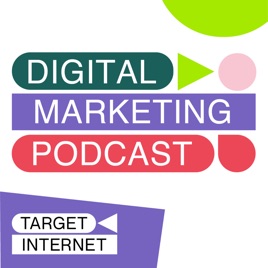
4.6
91
99
The Digital Marketing Podcast
Ciaran Rogers, Daniel Rowles and Louise Crossley
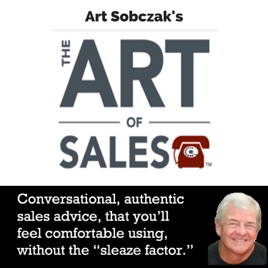
4.7
132
285
The Art of Sales with Art Sobczak
Art Sobczak, cold calling and sales trainer
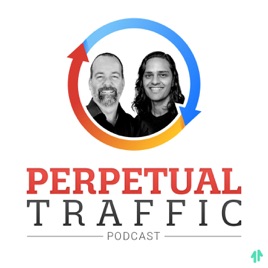
4.7
727
500
Perpetual Traffic
Tier 11
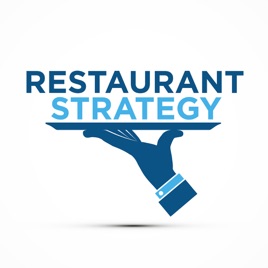
4.8
97
320
RESTAURANT STRATEGY
Chip Klose
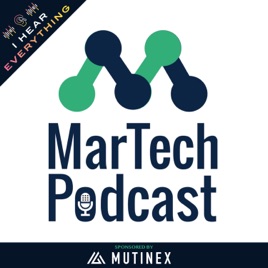
4.6
168
1889
MarTech Podcast ™ // Marketing + Technology = Business Growth
I Hear Everything
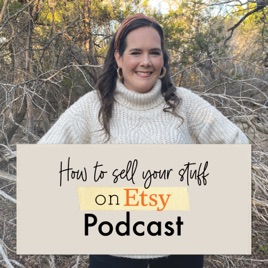
4.9
246
100
How to Sell Your Stuff on Etsy
Lizzie Smiley

4
8
36
WAKENG35
JustPod
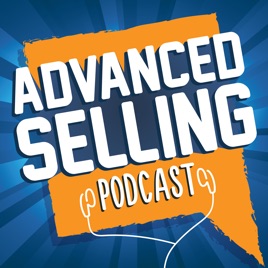
4.3
340
955
The Advanced Selling Podcast
Bill Caskey and Bryan Neale: B2B Sales Trainers, Business Strategists and L
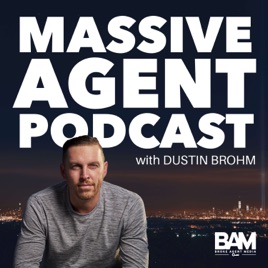
4.8
311
324
Massive Agent Podcast
Dustin Brohm



